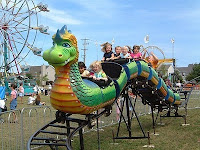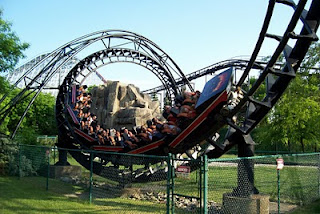Running into Narcolepsy (Part II)
(Note to reader: This is a continuation of my last blog post. To read Part I, click here.)
On July 10th, 2007, I returned to my school’s health services to meet with the sports medicine specialist about my “runner’s knee,” an issue that had developed over the last couple months.
Athletics had always been an important part of my life and my first year of law school was no different. Exercise was my break from “lawyer college” – a small slice of sanity I clung tightly to. By spring of 2007, I was running 7 miles twice a week, in addition to 3 or 4 mile runs on my “off” days. I also played squash a couple times a week. I may have been in the best shape of my life that spring and perhaps I ran myself into the ground.
At some point, I started to feel a sharp pain under my right knee. At first, I tried to just run through it, hoping it would just go away. Unfortunately, the pain didn’t go away, it did the opposite – it got worse. By June, the pain came on almost immedeately when I started running and lasted the entire workout. Next, I tried staying off it for a week, then two weeks but each time I went back to running, the pain returned like an unwelcome house-guest.
By July 10th, I was anxious to meet with the sports specialist. As crazy as this may sound, part of me thought that the knee-pain was the root of all my other problems. If only I could get back to running 20-30 miles a week, then maybe I would feel better… And maybe my sleepiness would go away… Unable to find any better explanations for why I felt so “off” that summer, my “runner’s knee” took a lot of the heat.
The sports medicine specialist was a younger female doctor. Pleasant, but all business – she conducted a thorough examination – twisting and turning, flexing and pointing, standing and sitting. And all the time playing a game of 20 questions. Somewhere in the midst of this intense, almost ritualistic examination, a question took me by surprise:
“Do your knees ever give out on you?”
“No. Well, yes, there’s this thing that happens when I laugh but no one knows what it is… Sorry, it has nothing to do with my running, it’s just a random thing that happens to me sometimes.”
I expected we’d continue on with her next rapid-fire question. But when I looked up at her, she was looking right back at me; apparently it was still my turn to talk. So I began telling her the same ridiculous tale that been telling friends and family members over the last year. The same crazy story I’d been painfully repeating in hopes that someone else knew the feeling – the falling inside my knees. (I described this more thoroughly in an earlier post, “Dangerous Laughter“)
“When something is funny, my knees give out on me slightly, as if someone hit me behind the knees, but then they catch themselves and quickly straighten up again. The incidents are getting worse – it’s a much bigger dip now…”
At first, the doctor looked at me like everyone else. But then she asked me to tell her more, and as I rambled on, she looked at me differently. It wasn’t her specialty but she thought she’d “heard of something like that before.”
She twirled around in her chair to face a clunky black and white computer screen. Sitting on the examination table just behind her, I read over her shoulder – my curiosity was uncontrollable. She hit only a few keys on the keyboard and I’ll never forget what I read “…loss of muscle tone….with emotions, such as laughter…” That was it! It was as if the words had been written exactly for me.
She wrote one word, like this — “cataplexy(?)”on a piece of scrap paper and told me to look up when I got home. She also said she’d be happy to refer me to a neurologist about this if I wanted. And then, we went back to talking about orthotics and stretching.
Leaving health services, nothing was truly definitive – I needed x-rays on my knee (that would later lead to a diagnosis of tendonitis and a frustrating expedition into the world of physical therapy). But there was a bounce in my step as I hurried to my car – I held this new word “cataplexy” in the palm of my hand.
Back in my apartment, I went online to look up cataplexy. I linked to a Wikipedia definition:
“A loss of muscle tone with strong emotions, most commonly laughter. Only found in people with narcolepsy.”
I gasped in disbelief. Narcolepsy? I was confused, did I have cataplexy or narcolepsy? I knew very little about narcolepsy but thought it was just a joke about someone falling asleep in the middle of a conversation. I’d never fallen asleep in the middle of the conversation.
However, as I read more definitions and visited more websites – everything began to make sense. Turns out cataplexy is a symptom of narcolepsy, so I probably had “narcolepsy with cataplexy.” And narcolepsy wasn’t the joke I originally thought it was. This was like hitting two birds with one stone. I shook in the silence of this lonely self-discovery.
This was one of the most overwhelming and underwhelming experiences of my life. On the one hand, it was as if someone was holding a mirror up to me, showing me the last couple years of my life from a totally new perspective. Another prominent symptom of narcolepsy is “hypnagogic hallucinations” and reading more about these, I realized that I’d been experiencing these for a few years now but had been brushing them off as some “really bad dreams.”
I’d never connected the bad dreams to the sleepiness or my knee-buckling laughter. These were some of the most random parts of my life coming together under one word – narcolepsy. Three birds with one stone. Narcolepsy… Really? (And I’d later find out that my unexplainable weight gain was probably linked to my narcolepsy as well. Four birds – one stone.)
However, on the other hand, this discovery was as meaningless as a horoscope or fortune cookie. At the time, I didn’t know that this was just the beginning of a much longer journey. Knowing the right words meant that I was not the only one. It made it real. But I also assumed that it made it better. I thought I’d just solved the puzzle, and now making it go away would be the easy part.


Hi Julie-
Awesome post. It was a bit like that for me too with cataplexy, I had no idea what was going on or that I should be paying attention to it. It sure is interesting looking backward once things start coming together!!!
Narcogirl
Thanks for sharing, Jules. To think that I thought your knees were buckling with laughter because I'm was damn funny in our H&K; days…
Keep writing – I love re-living this journey with you!
xoxoxoxo
wow…yet again i am thankful i dont have cataplexy, but it did help in getting your diagnosis..
i just walked in to my doc's office and told him i was having problems sleeping at night and staying awake in the day (for years) and my sleep pattern (REM right away)
he treated me for narcolepsy without a sleep study for 3 years…then it was confirmed
keep writing julie…it's insightful for me…great post!!
Thanks for increasing awareness of the disorder by sharing your experience. Voices are always needed on the subject. Hope you don't mind me asking, but what kind of treatment have you figured out. Is it pretty successful?
Thanks,
~Anna~
Hello Anna,
Thank you so much for your comment. It's such a pleasure sharing my experience with narcolepsy via this blog, thank you for reading!
Right now, I take Xyrem at night and generic Ritalin during the day. Adjusting to these medications was very difficult for me, but I found a fairly good balance eventually.
To be honest, the best "treatment" I have now is taking naps once or twice a day. Because I work from home, I have the ability to nap whenever I feel like it. This luxury has immensely improved my daily life. Now, its hard to imagine that I expended so much time and energy fighting my sleepiness when short naps relieves this struggle so much quicker.
If you'd like to discuss more about how I manage my symptoms and medications, please feel free to email me at julieflygare@gmail.com.
All my best,
Julie
Thank you so much for your blog which I stumbled on this morning-all the way from perth in Australia. Still working my way through my diagnosis 6 months ago and this blog hit home more than anything else I have read. You are right-there is a relief in just knowing that all the things you just live with-the tidal wave sleepiness, the weight gain, the continual push to function-actually are all tied into one illness. Still learning-but thanks for sharing. Am going back to the link to donate to the Boston Marathon runners.
Thanks again
Catherine
Catherine – Thank you so much for your message and for reading my blog all the way from Australia! Processing the diagnosis of narcolepsy can take some time. Please feel free to reach out to me if you ever have any questions you'd like to ask another person with narcolepsy.
Also, thank you so much for supporting Wake Up Narcolepsy's 2011 Boston Marathon efforts to raise money and awareness for narcolepsy. These funds support cutting edge research done by top narcolepsy researchers at Stanford Univ. and Harvard Medical School. We hope to make a difference for the futures of those living with narcolepsy.
All my best from Washington, DC – Julie (aka The REM Runner)
[…] moment when you find words that accurately describe your experiences. I remember mine […]
I’m so glad to have come across your blog as I’ve recently been diagnosed with narcolepsy. At seemingly random times my knees have given out on me but only slightly. I quickly can straighten up again and it’s never severe enough to the point of falling, but the way you described your knees giving out briefly was spot on! I’m not sure if my knees giving out could be from just the muscles relaxing or my legs getting tired, but because I haven’t found a pattern in these episodes relating to emotions or anything else, I’m still not too sure if they could be a mild form of cataplexy.
Hi Ashley, Thank you for your message. This sounds like it could possibly be cataplexy. Sometimes the emotions that trigger cataplexy are more subtle, I find it’s often around communication, when I’m trying to or about to communicate something with anticipation of the other person’s response – something ironic, funny, annoying or connected to something or someone close to my heart. Also, people with type 1 narcolepsy with cataplexy often go into REM sleep during their MSLT for a long portion of all 4 or 5 of their nap opportunities. Not sure if that helps but definitely keep paying attention to these episodes and bring this up with your sleep specialist. Sending wakefulness and strength your way, Julie